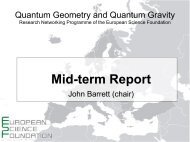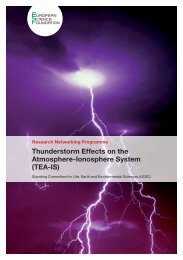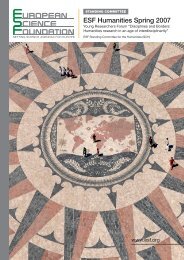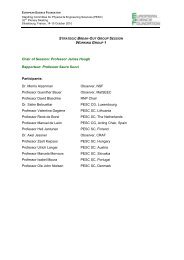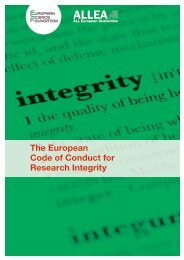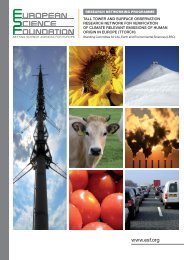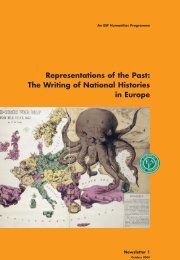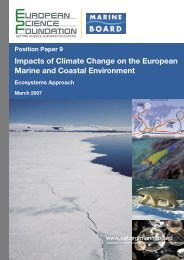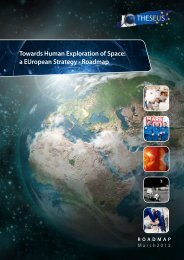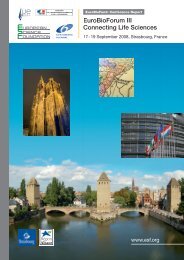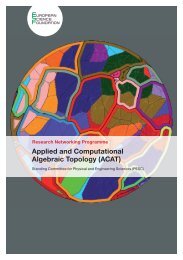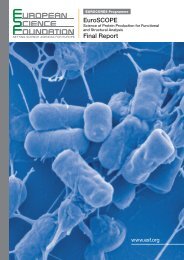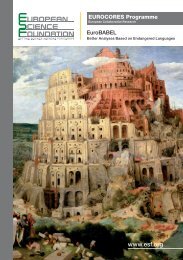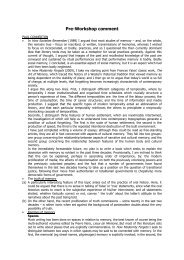6Responses to Environmental and Societal Challenges for our Unstable Earth (RESCUE)by different actors. It means examining the interplaybetween institutions and individuals, and understandinghow these interactions can block or drivesocietal change. Transforming society will requirepeople to question deeply-held values and assumptions,a process that can be supported by research.A vision of an open knowledge systemRESCUE proposes an innovative vision of how tosupport the transitions towards sustainability witheducation and research. The vision is built aroundthe idea of an open knowledge system. In an openknowledge system, knowledge is generated frommultiple sources (some of which are scientific) andshared at every stage of its development. Problemsare defined by society as a whole, not just by scientists.What needs to change?RESCUE identifies the following specific areas wherechange is needed, to move towards an open knowledgesystem.• The research frameworkIn Europe, there is no consistent and proactivepolicy to further collaboration across disciplines.The natural, human and social sciences should beintegrated from day one to develop joint questionson global environmental change. To achieve this,a common theoretical and operational frameworkfor research and innovation across disciplines isneeded.• Transdisciplinarity and new approachesSingle discipline research is essential, buttransdisciplinary work is required to meet thechallenges of an unstable Earth. This meansintegrated study of behavioural, social and naturalprocesses, with appropriate new research methods.Methodological approaches and data collectionprotocols should be developed through openconsultation. They should be formalised enoughto provide the basis for comparative analyses, yetflexible enough to address case-specific issues.Methods are needed that deal appropriately withuncertainty and unknowns, support the use ofexploratory agent-based modelling, combineparticipatory and modelling approaches, explorethe roles of human values and behaviour andstimulate change. Data and knowledge acquisitionshould be increasingly driven by the need forsolutions that help the societal transition towardssustainability, for example, by supporting anunderstanding of human behaviour or facilitatingsustainability policy development.• The production of knowledgeResearch and policy communities, and societyat large, need to work more closely together togenerate and integrate knowledge that is relevantand useful to responding to the challengesof an unstable Earth. RESCUE proposes aRadically Inter- and Transdisciplinary researchEnvironment (RITE) model as a strategy for globalenvironmental change research. This researchmodel is already used in medicine to ensure thatall relevant knowledge is harnessed collaborativelyfrom the outset when approaching a problem, andno single discipline maintains overall dominancewhen developing research programmes.• Education and sustainability learningA significantly different approach must bepromoted for education and capacity buildingto deliver the interdisciplinary and systemsresearch required to address global environmentalchange. The challenges for education and capacitybuilding cannot be met by ‘business as usual’approaches or by extrapolating experiences fromthe past into the future. There is a need to thinkdifferently. The latest findings from a range ofeducational research fields including cognitivescience, teaching methods, creativity andcollaborative knowledge creation could help totransform learning. These show, for example, thatexperiential processes encourage individuals to letgo of past assumptions and question underlyingbeliefs. Changes are needed throughout theeducation system, from pre-school throughprimary and secondary education to universityand beyond, encompassing adult education andcapacity building for all sectors of society.• Institutions that support the knowledge systemBringing an open knowledge system into existencewill require major institutional change. Forexample, it demands collective problem framing,societal agenda-setting, extended peer review,broader and more complex but transparentmetrics for research evaluation, better treatmentof uncertainty and values, procedures to ensurethat knowledge is ‘placed in context’, greaterflexibility of research funding, cooperation ofpublic and private organisations and stakeholderengagement. New media and new forms of publicparticipation, combined with expanded accessto information, will be crucial in building suchan open knowledge system. Institutions shouldencourage and facilitate engagement from allstakeholders in collective societal choices.
3. RESCUE recommendationsThe RESCUE initiative makes six recommendationsto science policy makers, funders and educators.These will help move towards an open knowledgesystem.Recommendation 1:Build an institutional frameworkfor an open knowledge systemTarget audience: <strong>Science</strong> policy makers,science fundersAn open knowledge society to tackle the environmentaland societal challenges of global changerequires an implementation-oriented researchagenda and a corresponding institutional framework.Participatory approaches and stakeholderengagement must bring more societal actors into theresearch and the evaluation processes and must begiven credit in both funding schemes and academiccareers. New criteria for evaluating ‘excellence’ inparticipatory, implementation-oriented processesare required. Long-term support and reward mechanismsare needed for integrative global changeresearch that responds to societal demands.Recommendation 2:Re-organise research so disciplinesshare knowledge and practices, and,from the onset, work together witheach other and with stakeholdersTarget audience: <strong>Science</strong> policy makers,science funders, research communityGiven the need to understand and include theunderlying human drivers of global change, thereis an urgent requirement for increasing the levelof targeted support for those social sciences andhumanities that can contribute to this effort.Research to support transitions to sustainabilitymust be interdisciplinary and transdisciplinary,beginning with a collective framing process thatincludes scientists from natural and social sciencesand the humanities as well as actors from civic society,the private and public sectors. The RadicallyInter- and Transdisciplinary Environment (RITE)model for global change research needs furtherdevelopment and then widespread implementation.Recommendation 3:Initiate long-term integrateddemonstration projectsTarget audience: <strong>Science</strong> funders, researchcommunity, practitioners, science policy makersA network of long-term integrated studies is requiredin order to encourage experimentation with differentapproaches for analysing and building the capacityof regions to deal with environmental changeand achieve sustainability. These studies must alsoaddress the human drivers and implications ofenvironmental change in broad empirical contexts.The studies must pay attention to the challenges ofincluding stakeholders in the entire research process.Learning to find a common language and joint problemframing must be evaluated and disseminatedwidely. The monitoring of these demonstration projectsshould enhance learning about how researchcan contribute effectively to sustainability transitions.Recommendation 4:Develop sustainability educationand learning in an innovative, openknowledge systemTarget audience: <strong>Science</strong> and education policymakers, educatorsLearning is the central element of an open knowledgesociety and essential for adapting to thecomplex and changing human condition in theAnthropocene. Processes are required that engageeducators from pre-school through universities andfar beyond, including a wide range of other professionalareas, in a dialogue about the educationand capacity building frameworks and institutionsneeded for an open knowledge and learning society.The new types of research needed to supportsustainability transitions and processes of engagementrequire new skills and capacities that must beprovided by the education system.Recommendation 5:Respond to the challenges andopportunities created by the internetfor an open knowledge system readyfor transitions towards sustainabilityTarget audience: <strong>Science</strong> policy makers,research communityThe internet provides a means of access to knowledge,a repository of knowledge, a research tool andan agora that facilitates the production, diffusionand use of knowledge in responding to societalproblems related to global environmental change.7Responses to Environmental and Societal Challenges for our Unstable Earth (RESCUE)



